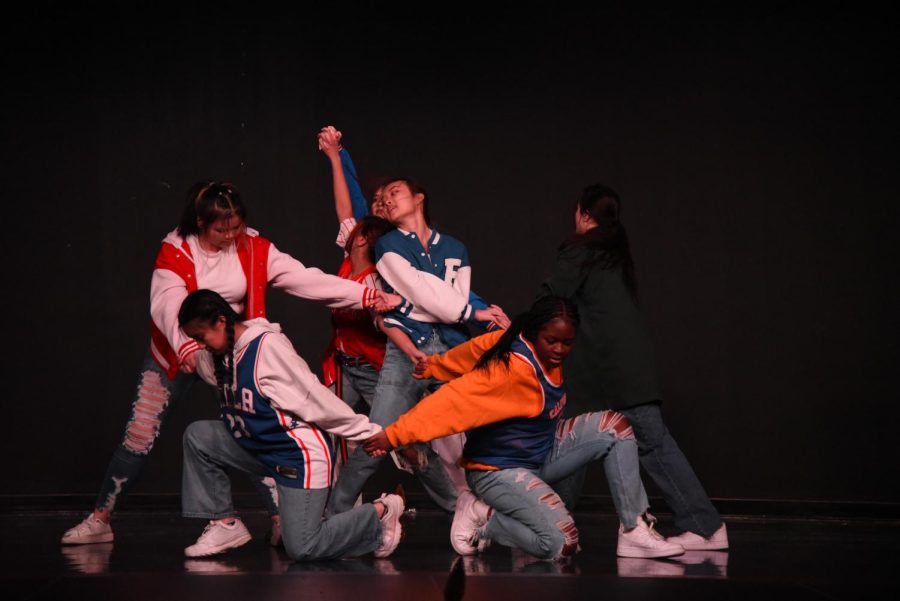How FRESA is turning a passion for Asian dance, pop culture into a Pitt community-builder
FRESA at Pitt performs a dance.
January 19, 2023
Mesmerizing dance moves, catchy pop songs and coordinating outfits are signature to FRESA’s “KPOP IN PUBLIC” dance videos, posted to their YouTube channel with more than 1,600 followers.
FRESA, or Fresh Entertainment by Student Artists, is a Pitt student-led organization that explores Asian pop culture through dance and song, producing music videos mimicking Korean pop, Japanese pop or Chinese pop groups. Members rehearse up to six hours per week to perfect the dancing, lip-syncing and coordination required to create seamless performances, all while wearing costumes of thrifted or reused clothing.
Winnie Chen, a senior psychology and Chinese major who serves as FRESA’s external vice president, explained that the club creates much more than dance videos — their inclusivity sets them apart.
“In terms of the social aspect, I think it helps people find others who love K-pop. It gives them a friend circle to communicate with people who won’t judge,” Chen said.
Most of the nation’s collegiate Asian pop dance clubs require auditions each semester to become a member, creating an exclusive and intimidating organization. Pitt’s FRESA welcomes everyone, regardless of experience.
Mina Clarelli, a senior English major and FRESA member, said she finds this inclusivity the most important aspect of the club culture.
“It doesn’t matter where these people come from, we’re just coming together to learn. It’s important to resonate with your similarities,” Clarelli said. “It creates a really healthy space, and I know not everything at Pitt is like that.”
Now creative director, Clarelli said FRESA taught her much more than what she learns in the classroom.
“I think, without it, I would be a lot more introverted,” Clarelli said. “Before, I was more reserved and less interested in talking to people. FRESA opened up a lot of doors for me.”
According to Clarelli, her membership in FRESA has furthered her academic career at Pitt as well. Without FRESA and her role filming and editing music videos, she never would have explored the film and media studies minor.
Aarushi Tripathy, a junior psychology major, said FRESA’s positive impact permeates the professional lives of all of its members, especially their individual work ethic and leadership skills.
“I’ve led multiple projects. As a leader, I’m responsible for setting up a timeline and practices and making sure all the members of my group learn the dance in increments,” Tripathy said. “You’re responsible for how your project ends up, so I guess I learned how to take on that responsibility. I’ve seen it help my confidence a lot.”
FRESA members may seem uber-confident in their music videos, but most grapple with performance anxiety, especially as new members. Caroline Vo, a sophomore psychology major serving as FRESA’s PR chair, said she overcame this fear of failure.
“I was a nervous wreck [when I joined]. I remember going on stage and I was shaking, I couldn’t breathe, because I was so afraid of messing up,” Vo said. “I realized at our fall Showcase that I didn’t feel that way anymore. It was a change of mindset.”
FRESA’s focus on Asian pop has also allowed members an active outlet to explore Asian culture, fulfilling their original mission statement to spread Asian pop culture on campus. Each semester, FRESA hosts an end-of-semester showcase, where some of FRESA’s 80 active members perform more than 20 student-led projects, both dancing- and singing-based. One of FRESA’s only audition-required events, the showcase serves as a catalyst for some members, like Chen, improving their confidence as well as their dancing ability.
“I think FRESA has made me unafraid,” Chen said. “I would’ve never thought that there would be a showcase three to four hours long just showing Asian pop culture. It’s brought me closer to my culture and showed that there are people who have the same passions as me.”
Vo, who further connects with Asian culture through her membership in the Vietnamese Student Association, agrees with the importance of curating welcoming spaces to explore Asian culture and personal passions.
“I felt so out of place in high school. I was maybe one of five people openly interested in K-pop because it was seen as ‘cringe.’ When I came to college and saw these people performing [K-pop] on stage, I was so shocked and excited,” Vo said. “I think it goes for anything. When you find something you’re really interested in, it’s so important to have a space where you can express that without feeling alienated and made fun of.”








